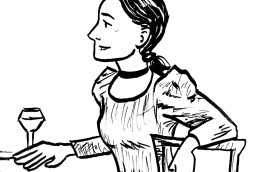by Katie May
Image credit: Keith Johnston
“Netball’s not a real sport.”
“Netball is just basketball for girls.”
“Netball is not a cool sport.”
These are just a few of the phrases you will hear about playing netball, whether you’re in primary school, university or play for a club at local, regional or national level. Even those who play it aren’t exempt to falling into the trap of believing, for whatever reason, that netball just doesn’t cut it as far as sports go.
Whilst, yes, there may appear to be too many rules, and the sport is viewed as seemingly inferior to its less restrictive ‘counterpart’ basketball, I get an overwhelming sense that the real issue with netball is its somewhat transgressive stance on women in sport. After all, although technically anybody can play netball, it is one of the only sports that is almost exclusively played by girls and women.
Somewhere between leaving primary school and starting secondary school, the wild abandonment that exists in abundance within children who play sport is misplaced.
As the boys are enthusiastically pushed towards football, rugby, cricket, basketball and hockey, girls begin their education in making sure their foundation is blended down the neck and trying to avoid anyone seeing that they sweat at all. Suddenly, girls step into the world of internalised misogyny and feel all the pressures of living in a society that can’t bear to see an ounce of fat in its media representations.
Sport is replaced by exercise, and teams are replaced by that voice in your head telling you to burn that extra slice of cake off. So for anyone with a vagina, exercise becomes an insidious means to an impossible end that no one can really reach.
And whilst most people can identify a number of sportsmen – whether they take an interest in that specific sport or not – well-known sportswomen appear to be fewer and further between. Whilst many male footballers earn millions, most female players earn their living through other forms of work too. Whilst men are positioned in the leading role when it comes to sport, women are side-lined, or, in the case of the BBC Sport website, ‘tabbed’. So where does netball fit in to this? Why should you play it? And why is it such an important sport?
When I started playing netball at ten years old, I learned that one of the most important parts of teamwork is simply showing up. When six people rely on you to complete the team, you feel a sense of purpose. When you’re having an off day, you have a whole squad to pull you back up. From laughing and joking as a team about the repressed anger you take out on the court, to hysterically sobbing after you win a game by one goal, netball teaches girls and women about the importance of building each other up.
Its many rules make it not only a sport about physicality, but about quick and thoughtful mental agility too. Netball emphasises the importance of respecting your umpires and the opposition, with every match ending in hand shakes and a “three cheers for [the opposition] and the umpires.”
Although the sport is not professionalised in England at the time of writing, 2016 saw the first opportunity for elite players to go full-time. With netball seeing a rise in popularity and thus funding, girls will be able to see a sport in which women can be – and are – the frontrunners. As I continue to play netball at twenty-two years old, I can see more than ever the importance of the values that netball has taught me.
Through playing for Teesside University Netball Club for the last four years I have not only gained a better understanding of the sport itself, but also the necessity and impact of a supportive team on and off the court.
Katie May
Katie is 22 years old and she has recently completed her masters’ in English and plans to undertake a PhD and pursue a career in academia. She is extremely introverted (and proud), and currently trying to find her feet as an anxious postgraduate in the adult world. Writing – whether it be journals, poems, or essays – often helps her attempt to make sense of the world around her. She has been writing poetry for about about 7 years – heavily based on her own personal experiences of mental health. More recently she has started writing a range of articles and blog posts for different organisations that reflect some of her other passions and interests, such as feminism, education, and sport.








